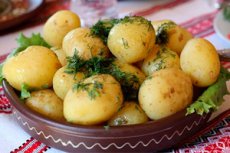
All iLive content is medically reviewed or fact checked to ensure as much factual accuracy as possible.
We have strict sourcing guidelines and only link to reputable media sites, academic research institutions and, whenever possible, medically peer reviewed studies. Note that the numbers in parentheses ([1], [2], etc.) are clickable links to these studies.
If you feel that any of our content is inaccurate, out-of-date, or otherwise questionable, please select it and press Ctrl + Enter.
Potatoes in hyperacid and hypoacid gastritis
Medical expert of the article
Last reviewed: 04.07.2025

Potatoes are the second bread for many people, first courses are unthinkable without them, they are an integral part of many salads, they are a popular side dish, so only a serious illness can exclude them from our person’s diet.
Potatoes are an affordable and unique food product among vegetables, they are rich in carbohydrates, contain healthy fats (MUFA and PUFA), a significant amount of vitamin C, fiber and potassium. [ 1 ] In traditional European medicine, raw potatoes are used for gastrointestinal and dyspeptic disorders. [ 2 ]
Indications
How does potato affect digestion and can it be eaten with gastritis?
Can you eat potatoes if you have gastritis?
This root vegetable can be prepared in such a way that it is useful and acts as a medicine for the stomach, or it can be made into an undesirable product and even harmful.
Gastritis includes pathologies caused by inflammation of the gastric mucosa, its various defects, loss of the ability of the secretory glands to normally produce digestive enzymes for processing food, and weakening of the organ's motor functions.
The symptoms either manifest themselves acutely and painfully, or they develop into a calmer chronic condition, periodically reminding of themselves when deviating from the rules of nutrition: excessive consumption of alcohol, spicy, fried, sour foods; stressful situations; treatment with medications.
Different stomach conditions allow one or another type of potato to be consumed.
Potatoes for gastritis with high acidity
With increased acidity, there is an excessive secretion of hydrochloric acid, which is an aggressive environment relative to the gastric mucosa. Therefore, enveloping food will have a positive effect, which will protect the walls of the organ from aggressive factors and the progression of the inflammatory process. Potatoes contain starch, which is the same protective mechanism.
Hyperacid gastritis allows you to eat potatoes in soups, boiled whole in their skins, without skin, mashed, baked, stewed (without adding fat). And the raw root vegetable and its juice generally have medicinal properties.
Potatoes for exacerbation of gastritis
Exacerbation of gastritis requires a stricter diet, but there is also a place for potatoes. Baked - the best dietary dish, mashed potatoes of liquid consistency on water with the addition of a small amount of butter is also suitable.
But potato juice will relieve pain and inflammation in case of increased acidity. In case of atrophic gastritis, which is characterized by secretory insufficiency, it will only cause harm, therefore it is prohibited.
Benefits
The most useful young potatoes are those grown on your own plot without the use of chemicals to control weeds and pests. Firstly, it is an easily digestible vegetable carbohydrate, and secondly, it contains vitamins C, K, PP, group B, and minerals such as potassium, phosphorus, calcium, iron, magnesium, sodium, zinc, bromine, silicon, copper, etc. Of the dry substances in potato tubers, there is most starch, protein with all the amino acids found in plants, sugars, pectin substances, and organic acids. Cooked potatoes contain 544 mg of potassium / 100 g and 27 mg of magnesium / 100 g, which is 12% and 7% of the daily intake of potassium and magnesium recommended by the US Institute of Medicine. [ 3 ]
Potato has antioxidant effects. [ 4 ], [ 5 ] It has also demonstrated hypocholesterolemic, anti-inflammatory, anti-obesity, anti-cancer and anti-diabetic effects. [ 6 ] Potato glycoalkaloids, α-chaconine, α-solanine and solanidine, as well as potato peel extracts, have anti-inflammatory effects in vitro. [ 7 ]
Complications
Potatoes are generally considered a high glycemic index (GI) food, with mashed potatoes having the highest GI values, while baked potatoes, French fries, and potato chips have medium GI values. [ 8 ] At least 17 studies, mostly observational, have examined the association between dietary factors and type 2 diabetes. Only 2 studies (case–control and cross-sectional) reported a significant association between potato consumption and the risk of developing T2D. [ 9 ] Epidemiological data have shown an association between potato product consumption and weight gain (Mozaffarian et al. 2011), but these studies did not separate out the effects of components added during preparation/processing, such as fat, or other foods consumed with potatoes. [ 10 ]
Complications are possible due to an increase in the glycemic index, as well as an exacerbation of gastritis if the acidity is not established and does not correspond to the effect of potatoes on the walls of the stomach.

